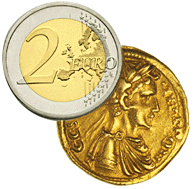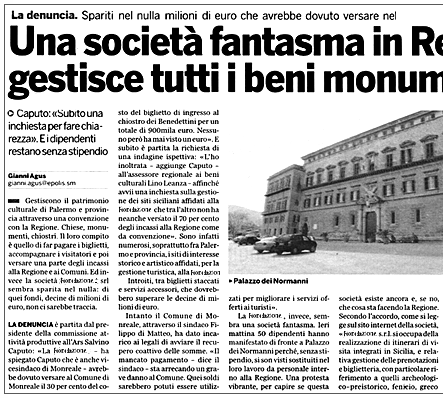...Best of Sicily presents... Best of Sicily Magazine. ... Dedicated to Sicilian art, culture, history, people, places and all things Sicilian. |
by Maria Luisa Romano | |||
Magazine Index Best of Sicily Arts & Culture Fashion Food & Wine History & Society About Us Travel Faqs Contact Map of Sicily |
Established in the 1990s, the "foundation" was a typical money-making scheme linking the private and public sectors of Sicily's tourism economy. For decades the people who sold tickets at Sicily's more important historical and archeological sites were public employees. This changed when the local acquaintances of a few influential politicians persuaded the Sicilian cultural assets authority to "outsource" these lucrative services. The ringleaders of the new "foundation," which was constituted specifically to cash in on several politicians' ideas for making money, made the case that they were providing jobs to a few hundred "young" people ranging in age from their mid-twenties to their early forties who were chronically unemployed in Sicily's stagnant economy. There were several problems with both the pretext and the specifics of the proposal, and with such plans in general.
Here in Sicily proposals that purport to cure the chronic unemployment situation are a sure-fire way of obtaining public funds, or at least political support. The "downside" is that most of these schemes are temporary at best, and they are usually undertaken with the express purpose of making money only over the short term. It's as if a magician promised something impossible and the entire audience fell for it, except that in this case nobody needed magic to make money "disappear," just some mediocre sleight of hand. Such a ploy may work for a while. But there is always the dangerous possibility that at some point a scheme can become a scam. In some cases the failure is a simple matter of incompetence based on inexperience in management and marketing, as though an unemployed engineer were suddenly required to produce a Broadway musical. This happens with so many publicly-funded schemes in Sicily's tourism sector that it could be considered the norm rather than the exception. Such was the case of the association that sought to promote visits of Palermo's Arab kanats, whose reception center in Via Maqueda closed in 2002, having been open for just three years. Other cases are clearly worse. Funds designated for the infamous Dionysos, a twelve-million euro web-based promotion of Segesta's archeological site, were found in offshore accounts following an international investigation of the short-lived project which had ceased to operate by 2003. Then there was the whole idea of sub-contracting a service to what was ostensibly a private firm, actually financed with public funds. The concept of "mixed" public-private companies of this kind is rarely very practical. It's a political solution, not a commercial one, and it is potentially risky to let political appointees oversee or actually manage a firm in which they have a direct financial interest, something like allowing the fox to guard the hen house. And these hens have been laying golden eggs for years. At Palermo's historical sites, including the Norman Palace, the foundation retained 30 percent of the ticket receipts. At Monreale's cloister it reportedly was allowed by contract to keep an astounding 70 percent of the revenue! Yet most of the employees were part-time workers paid between 400 and 600 euros per month, while the funds due the public agencies have not been remitted for years. The entire pretext of the foundation was ridiculous from the very start. Was there ever any genuine need to outsource these services in the first place? Wasn't it really just a ploy for a few politicians' friends to make some extra money? Why not just set up an agency within the tourism bureau, answerable directly to the proper authorities, to handle ticket sales and other functions? Instead, the present, deplorable situation continued for years before anybody inquired about the misplaced funds. When this finaly did occur, it emanated from circles within a rival political party which had recently come to power.
For now, the major problem is a simple matter of failure to remit monies to the proper agencies. Only one individual has been charged - for alleged embezzlement of a relatively small fraction (approximately 100,000 euros) of the foundation's funds. But at the very least there has been gross mismanagement. Things reached the boiling point in July (2009) when, for the second time, the foundation failed to pay several hundred employees, who now publicly contested the foundation, with fifty protesting at the Norman Palace. In view of increasing public scrutiny and threatened legal action, the firm's website (which was never particularly informative) was hurriedly taken offline, while its managers could not be reached for comment. It was estimated that millions of euros could not be accounted for, with the press calling the foundation a "società fantasma," a phantom company. What we seem to have here is the typical "project" established with European Union and Italian funding. True, the foundation was a little different than most because it had a reliable source of continuous revenue so it wouldn't have to depend on public funding indefinitely. Entry fees at Monreale's cloister and Palermo's Norman Palace complex range from 6 to 12 euros per person, and at each site there are hundreds of thousands of paying visitors each year. The present problem is not limited to Palermo; the foundation recently began managing ticket sales at the Agrigento archeological site and elsewhere. Where has the money gone? The mayor of Monreale, among others, was asking that question. Unfortunately, satisfactory answers were not immediately forthcoming. The Italian daily La Repubblica reported an arrest on 26 September 2009. The
text follows as published but with names of both Foundation and suspect indicated as 'ZZZZ' and 'XXXX' respectively (it is the policy of this
website not to indicate identities of politicians for three reasons, namely: the presumption of innocence during an investigation/trial, the fact
that in any event they would be unknown to most readers outside Sicily, some such persons actually enjoy any kind of 'publicity' and
we prefer not to indulge them): About the Author: Maria Luisa Romano has written about social topics for various Italian magazines, including this one. | ||
Top of Page |
 When you purchase a ticket at Palermo's Norman Palace,
Monreale's cloister or Agrigento's Valley of the Temples, where does the revenue go? It's a lot of money. It's managed by a
semi-public "foundation" awarded an important public contract that guranteed gross revenues of millions of
euros from ticket sales over just two or three years. And it has become a public fiasco.
When you purchase a ticket at Palermo's Norman Palace,
Monreale's cloister or Agrigento's Valley of the Temples, where does the revenue go? It's a lot of money. It's managed by a
semi-public "foundation" awarded an important public contract that guranteed gross revenues of millions of
euros from ticket sales over just two or three years. And it has become a public fiasco. By the end of 2008 serious problems were being
reported in the press. The main one was that none of the money was making its way into
the public coffers. The foundation's managers, who maintained offices in Palermo's stylish Via Libertà district, could rarely be
found, and there was talk of an investigation by the Guardia di Finanza, Italy's treasury police, to determine why things like fuel for
the motorboat of one of the managers were charged to the foundation's credit card. Then there were those holiday trips abroad.
The accused parties said that they had always planned on reimbursing these charges, which may even have been the
case, but they didn't say so until their actions were made public. Don't these folks have their own credit cards for charging personal expenses?
By the end of 2008 serious problems were being
reported in the press. The main one was that none of the money was making its way into
the public coffers. The foundation's managers, who maintained offices in Palermo's stylish Via Libertà district, could rarely be
found, and there was talk of an investigation by the Guardia di Finanza, Italy's treasury police, to determine why things like fuel for
the motorboat of one of the managers were charged to the foundation's credit card. Then there were those holiday trips abroad.
The accused parties said that they had always planned on reimbursing these charges, which may even have been the
case, but they didn't say so until their actions were made public. Don't these folks have their own credit cards for charging personal expenses?